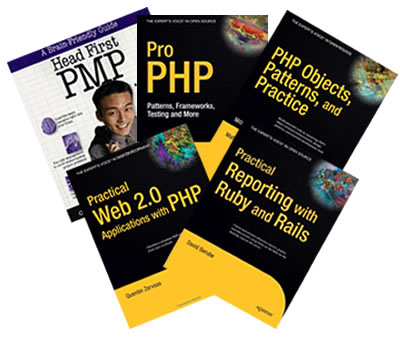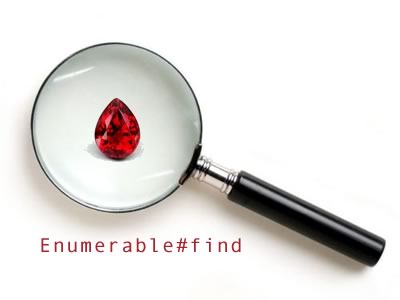
Welcome to the second installment of Enumerating Enumerable, my project to do a better job of documenting Ruby’s Enumerable module than RubyDoc.org. This installment will cover Enumerable#any?, which I like to think of as Enumerable.all?‘s more easy-going cousin (I covered Enumerable.all? in the previous installment).
Enumerable#any? Quick Summary

| In the simplest possible terms | Do any of the items in the collection meet the given criteria? |
|---|---|
| Ruby version | 1.8 and 1.9 |
| Expects | A block containing the criteria. This block is optional, but you’re likely to use one in most cases. |
| Returns | true if any of the items in the collection meet the given criteria.
|
| RubyDoc.org’s entry | Enumerable#any? |
Enumerable#any? and Arrays
When used on an array and a block is provided, any? passes each item to the block. If the block returns true for any item during this process, any? returns true; otherwise, it returns false.
# "Fromage de Montagne de Savoie" is the longest-named cheese in this list
# at a whopping 29 characters
cheeses = ["feta", "cheddar", "stilton", "camembert", "mozzarella", "Fromage de Montagne de Savoie"]
cheeses.any? {|cheese| cheese.length >= 25}
=> true
cheeses.any? {|cheese| cheese.length >= 35}
=> false
When the block is omitted, any? uses this implied block: {|item| item}. Since everything in Ruby evaluates to true except for false and nil, using any? without a block is effectively a test to see if any of the items in the collection evaluate to true (or conversely, if all the values in the array evaluate to false or nil).
cheeses.any? => true cheeses = [false, nil] => [false, nil] cheeses.any? => false # Remember that in Ruby, everything except for false and nil evaluates to true: cheeses << 0 => [false, nil, 0] >> cheeses.any? => true
Enumerable#any? and Hashes
When used on a hash and a block is provided, any? passes each key/value pair in the hash to the block, which you can “catch” as either:
- A two-element array, with the key as element 0 and its corresponding value as element 1, or
- Two separate items, with the key as the first item and its corresponding value as the second item.
If the block returns true for any item during this process, any? returns true; otherwise, it returns false.
# Here's a hash where for each key/value pair, the key is a programming language and
# the corresponding value is the year when that language was first released
# The keys range in value from "Javascript" to "Ruby", and the values range from
# 1987 to 1996
languages = {"Javascript" => 1996, "PHP" => 1994, "Perl" => 1987, "Python" => 1991, "Ruby" => 1993}
languages.any? {|language| language[0] < "Pascal"}
=> true
languages.any? {|language, year_created| language < "Pascal"}
=> true
languages.any? {|language| language[0] < "Fortran"}
=> false
languages.any? {|language, year_created| language < "Fortran"}
=> false
languages.any? {|language| language[0] >= "Basic" and language[1] <= 1995}
=> true
languages.any? {|language, year_created| language >= "Basic" and year_created <= 1995}
=> true
languages.any? {|language| language[0] >= "Basic" and language[1] <= 1985}
=> false
languages.any? {|language, year_created| language >= "Basic" and year_created <= 1985}
=> false
Using any? without a block on a hash is meaningless, as it will always return true. When the block is omitted, any? uses this implied block: {|item| item}. In the case of a hash, item will always be a two-element array, which means that it will never evaluate as false nor nil.
And yes, even this hash, when run through any?, will still return true:
{false => false, nil => nil}.any?
=> true
Special Case: Using Enumerable#any? on Empty Arrays and Hashes
When applied to an empty array or hash, with or without a block, any? always returns false. That’s because with an empty collection, there are no values to process and return a true value.
Let’s look at the case of empty arrays:
cheeses = []
=> []
cheeses.any? {|cheese| cheese.length >= 25}
=> false
cheeses.any?
=> false
# Let's try applying "any?" to a non-empty array
# using a block that ALWAYS returns true:
["Gruyere"].any? {|cheese| true}
=> true
# ...but watch what happens when we try the same thing
# with an EMPTY array!
[].any? {|cheese| true}
=> false
…now let’s look at the case of empty hashes:
languages = {}
=> {}
languages.any? {|language| language[0] < "Pascal"}
=> false
languages.any? {|language, year_created| language < "Pascal"}
=> false
languages.any?
=> false
# Let's try applying "any?" to a non-empty hash
# using a block that ALWAYS returns true:
{"Lisp" => 1959}.any? {|language| true}
=> true
# ...but watch what happens when we try the same thing
# with an EMPTY hash!
{}.any? {|language| true}
=> false




